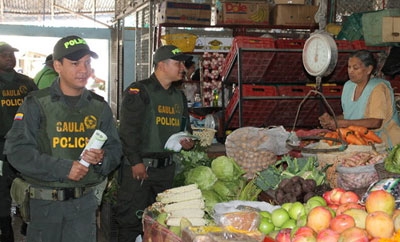Micro-extortion of everyone from teachers to bicycle taxi drivers is funding small criminal groups across Colombia, according to analysts and crime reports, with the small-scale nature of the crime illustrating the country’s changing criminal landscape.
A report by El Tiempo collates figures from different Colombian departments to paint a picture of the “Sicilian” style extortion — so-named for the use of this method in Italian neighborhoods in the United States — carried out by street gangs.
In three towns in Cordoba, 189 teachers reported paying about $7.90 a month to work; in Tumaco, a town in Nariño, around 1,300 business have been forced to close since 2011; in Barranquilla, shopkeepers must pay about $26.50 monthly; and in Bogota, bicycle taxis pay $1.50 a day.
Nearly 150 different gangs earn up to $105,000 a month from micro-extortion in the major cities of Medellin and Barranquilla, according to the Prosecutor General’s Office. Various small groups with no national presence fight for control at a very local level, said one prosecutor.
InSight Crime Analysis
While Colombia has a long history of extortion, the crime has dramatically changed in nature over the years. As explained by El Tiempo, a crime that used to see large sums of money extorted from rich businessmen and multinational companies is now woven into the fabric of daily life in poor communities, with street gangs forcing constant small amounts from anyone they can.
An investigation earlier this year by El Tiempo attributed 83 percent of extortion cases to “common criminals,” illustrating how widespread micro-extortion has become the principal income source for the lowest rung of Colombian organized crime — a trade estimated to be worth over $1 billion a year. The line between low-level gangs and major criminal organizations such as the Urabeños is not clear cut, however, as the big groups often contract out work to local outfits and small-time criminals often operate using the name of major organizations to frighten their victims.
The government recently proposed almost doubling the maximum sentence for extortion from 18 to 32 years. But given that the small amounts being demanded mean tolerating the “tax” is preferable to the fear of retaliation for reporting it — and that extortion rackets are run from jails across Latin America — such a measure seems unlikely to make a real dent in the crime.

